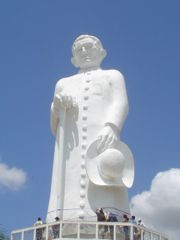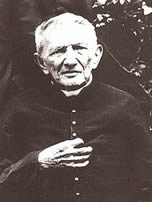Cícero Romão Batista, o Padre Cícero
 Fortaleza
Fortaleza Ceara
Ceara

Statue of Padre Cicero
Cícero Romão Batista was born in Crato on March 24th 1844 and died in Juazeiro do Norte on July 20th 1934.
He is best known as Padre Cícero, which means Priest Cícero. The masses refer to him as Padim Ciço; Padim is the popular way to say Padrinho (which means both Little Priest and Godfather), and Ciço is the short for Cícero.
He joined the Church in 1865, through Seminary of Prainha, in Fortaleza; he was ordered as Priest in 1870.
In 1872, he was appointed Vicar of Juazeiro do Norte, which was then a small village, subordinated to the municipality of Crato. Cícero worked to fund the building of the first Church in Juazeiro, and started a religous work which was unheard of in Juazeiro, with preachings and personal visits to the homes of the faithfuls.
In 1889, when receiving the Communion from Padre Cícero, the mouth of a woman called Maria de Araújo started to bleed. People saw this as a miracle. The towels used to wipe the bleed became objects of worship; news spread, and soon Juazeiro was being visited by pilgrims, looking after the powers of the Priest.
The Vatican charged Cícero of fomenting Mystification (manipulation of people's beliefs) and Heresy (disrespect to Canonical Orders); in 1894, he was punished with suspension of Order.
All through the rest of his life, Cícero tried to lift the punishment. In 1898, he went to Rome and met Pope Lion XIII, who gave Cícero partial indult, but maintained the prohibition to celebrate masses. Despite the prohibition, Padre Cícero never stopped celebrating masses at his Church in Juazeiro.

Padre Cicero
Taking advantage of his enormous popularity, Cícero entered Politics.
In 1911, Cícero was elected Mayor of Juazeiro do Norte; he was re-elected a few times, and remained Mayor for fifteen years. In a region dominated by two olygarchies, Cícero had to opt which one to align with; in 1911, the Federal Government sent troops to occupy Juazeiro. Cícero convinced the citizens to take in arms, and obliged the Government to retreat.
Later on, Cícero was elected vice-Governor of Ceará and Federal Representative; alleging that he didn't want to leave Juazeiro, he didn't exercize these offices.
Until his death, Cícero remained one of the most important Politicians of Ceará.
After his death, in a time and place where books and newspapers were rare and formal education levels were low, his fame and miracles were widespread with such an exaggeration, particularly by popular poets, that soon he gained fame of Saint. Even though still banned by the Vatican, Cícero became a Saint of Sertão.
At the end of 20th Century, Pope Bendict XVI, when he was still a Cardinal, proposed a study about Padre Cícero; the study could lead to the total indult of Cícero and eventually recognize him as Saint. Such study is still in progress.
In 2001, TV Globo, the most popular television in Brazil, conducted a comprehensive survey all across Ceará to elect the Person of the Century in Ceará. The people elected Padre Cícero.
Read more:
Padre Cícero. Site about the life of Padre Cícero.
Top of page